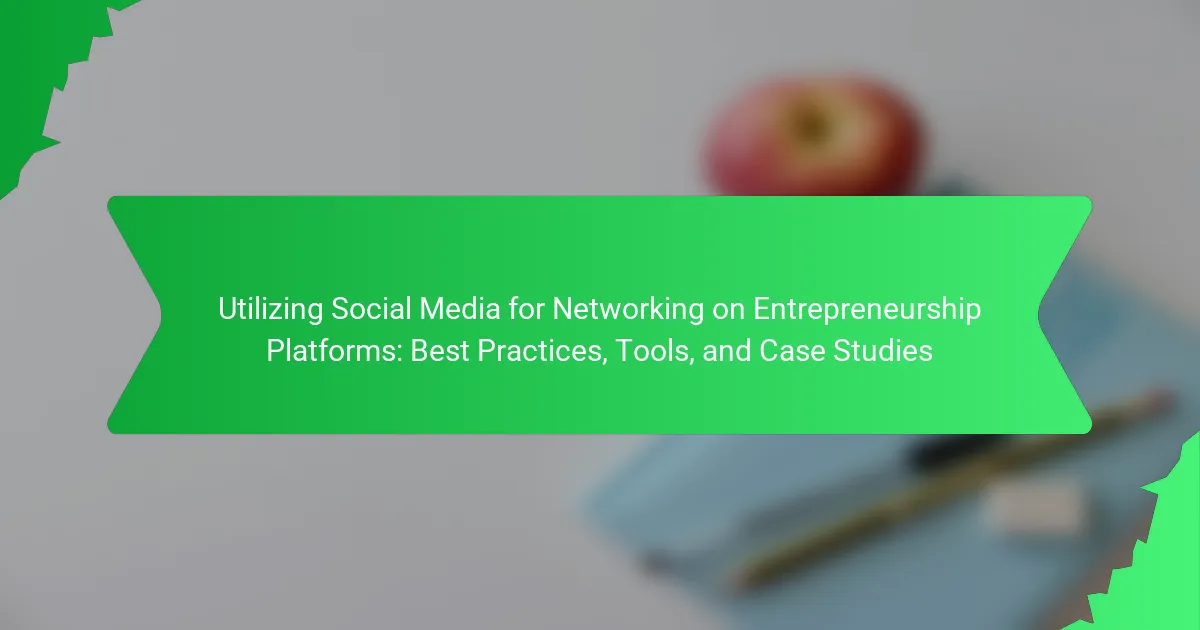Social media serves as a vital tool for networking on entrepreneurship platforms, connecting entrepreneurs, investors, and mentors. Key platforms such as LinkedIn, Twitter, and Meetup facilitate the sharing of ideas and resources, fostering collaboration and innovation while increasing visibility for startups. Best practices for leveraging social media include maintaining a professional online presence, engaging with industry content, and utilizing networking tools effectively. Successful entrepreneurs like Elon Musk, Gary Vaynerchuk, and Sophia Amoruso exemplify how strategic use of social media can enhance networking opportunities and drive business growth. This article provides an overview of best practices, essential tools, and notable case studies to illustrate the impact of social media on entrepreneurship networking.

What is the role of social media in networking on entrepreneurship platforms?
Social media plays a crucial role in networking on entrepreneurship platforms. It facilitates connections among entrepreneurs, investors, and mentors. Platforms like LinkedIn and Twitter allow users to share ideas and resources. This sharing fosters collaboration and innovation. Social media also enables entrepreneurs to showcase their projects and attract potential partners. According to a survey by the Global Entrepreneurship Monitor, 63% of entrepreneurs use social media for networking purposes. This statistic highlights the importance of social media in building professional relationships. Additionally, social media provides access to a wider audience, increasing visibility for startups. Overall, it serves as a vital tool for establishing and expanding professional networks in entrepreneurship.
How does social media enhance networking opportunities for entrepreneurs?
Social media enhances networking opportunities for entrepreneurs by providing platforms for direct interaction and engagement. Entrepreneurs can connect with potential partners, customers, and investors through social media channels. These platforms facilitate the sharing of ideas and resources, fostering collaboration. For example, LinkedIn allows users to join industry-specific groups and participate in discussions. Research indicates that 70% of entrepreneurs use social media for networking purposes. This statistic highlights the significance of these platforms in building professional relationships. Additionally, social media allows for the promotion of personal brands, increasing visibility within the entrepreneurial community.
What specific features of social media facilitate networking?
Social media platforms facilitate networking through features such as user profiles, direct messaging, and groups. User profiles allow individuals to showcase their skills and experiences. This visibility helps others identify potential connections for collaboration. Direct messaging enables private conversations, fostering relationship-building. Groups create communities around shared interests, enhancing engagement and networking opportunities. Additionally, event features promote networking through virtual gatherings. Hashtags increase discoverability, allowing users to connect with like-minded individuals. These features collectively enhance the ability to network effectively on social media.
How do different social media platforms vary in their networking capabilities?
Different social media platforms vary significantly in their networking capabilities. Facebook allows for extensive group interactions and event planning. LinkedIn is tailored for professional networking and job opportunities. Twitter facilitates quick updates and public conversations through tweets. Instagram focuses on visual content, enhancing brand visibility and engagement. Snapchat emphasizes ephemeral content, fostering real-time connections among users. Each platform’s unique features cater to different networking needs. For instance, LinkedIn has over 900 million users, making it a powerful tool for professional connections. Facebook’s groups can host thousands of members, promoting community engagement.
What are the benefits of utilizing social media for networking in entrepreneurship?
Utilizing social media for networking in entrepreneurship offers several benefits. It enables entrepreneurs to connect with a broader audience, including potential clients, partners, and investors. Social media platforms facilitate real-time communication, allowing for quick exchanges of ideas and feedback. They also provide access to industry-specific groups and communities, fostering collaboration and support among entrepreneurs.
Statistics show that 73% of marketers believe that their efforts through social media marketing have been “somewhat effective” or “very effective” for their business. Social media helps in building brand awareness, as entrepreneurs can showcase their products and services to a larger audience. Additionally, it allows for targeted advertising, reaching specific demographics effectively.
Networking through social media can lead to valuable mentorship opportunities, as experienced professionals often share insights and advice. Furthermore, entrepreneurs can stay updated on industry trends and news, enhancing their knowledge and strategy. Overall, social media serves as a powerful tool for building professional relationships and growing a business in today’s digital landscape.
How can social media improve visibility and reach for entrepreneurs?
Social media can significantly enhance visibility and reach for entrepreneurs. It provides a platform for entrepreneurs to showcase their products and services to a global audience. According to a 2021 survey by Hootsuite, 54% of social media users research products on these platforms. This indicates that social media is a vital tool for customer engagement and brand awareness. Entrepreneurs can leverage targeted advertising to reach specific demographics, increasing their chances of attracting potential customers. Social media also facilitates networking opportunities, allowing entrepreneurs to connect with industry peers and influencers. Engaging content can lead to shares and increased visibility, further expanding reach. Overall, social media serves as an essential marketing tool for entrepreneurs looking to grow their businesses.
What networking advantages do entrepreneurs gain from social media engagement?
Entrepreneurs gain several networking advantages from social media engagement. They can connect with a broader audience, including potential customers, investors, and industry peers. Social media platforms allow for real-time communication and feedback, enhancing relationship-building. Entrepreneurs can showcase their expertise and establish credibility through content sharing. Networking opportunities increase as they participate in relevant discussions and groups. Analytics tools on these platforms enable entrepreneurs to identify and engage with key stakeholders. According to a survey by the Pew Research Center, 69% of adults use social media, highlighting its potential reach. This engagement can lead to collaborations and partnerships that may not have been possible otherwise.

What best practices should entrepreneurs follow when using social media for networking?
Entrepreneurs should maintain a professional online presence when using social media for networking. This includes using a clear profile picture and a concise bio that highlights their expertise. Engaging with industry-related content is crucial. Sharing insights and commenting on posts helps build visibility. Networking should involve reaching out to peers and influencers in a respectful manner. Sending personalized connection requests increases the likelihood of acceptance. Consistency in posting is also important. Regular updates keep the audience engaged and informed. Monitoring analytics can provide insights into what content resonates best with followers. These practices enhance networking opportunities and foster meaningful connections.
How can entrepreneurs effectively build their online presence?
Entrepreneurs can effectively build their online presence by leveraging social media platforms. They should create professional profiles on platforms like LinkedIn, Facebook, and Instagram. Consistent posting of valuable content is essential for engagement. Interacting with followers through comments and messages fosters community. Utilizing analytics tools helps measure engagement and refine strategies. Collaborating with influencers can expand reach significantly. Regularly updating profiles with achievements keeps the audience informed. Participating in industry-related discussions enhances visibility and credibility. These strategies are backed by studies showing that 73% of marketers believe that their efforts through social media have been “somewhat effective” or “very effective” for their business.
What strategies can enhance engagement with potential connections?
Utilizing personalized communication enhances engagement with potential connections. Tailoring messages to individual interests fosters a sense of relevance. Engaging through comments and shares on their content builds rapport. Hosting interactive sessions, such as webinars or Q&A, encourages active participation. Consistently providing valuable content attracts attention and keeps connections engaged. Utilizing analytics tools helps identify the most effective engagement strategies. Research shows that personalized outreach increases response rates by up to 50%. Regular follow-ups maintain relationships and demonstrate ongoing interest.
How should entrepreneurs tailor their content for different platforms?
Entrepreneurs should tailor their content for different platforms by understanding the unique audience and format of each platform. For instance, visual platforms like Instagram require high-quality images and short captions. In contrast, LinkedIn favors professional articles and networking posts. Twitter demands concise messaging due to its character limit, emphasizing brevity and clarity. Facebook allows for longer posts and community engagement, making it suitable for storytelling and discussion.
Additionally, entrepreneurs should consider the timing and frequency of posts. Research shows that posting during peak engagement times increases visibility. Tailoring content also involves using platform-specific features like hashtags on Instagram and Twitter or polls on Facebook.
Understanding analytics can further guide content strategy. Analyzing engagement metrics helps entrepreneurs refine their approach. This targeted strategy enhances reach and connection with the audience on each platform.
What common mistakes should entrepreneurs avoid on social media?
Entrepreneurs should avoid posting inconsistent content on social media. Consistency builds brand identity and trust. They must also refrain from neglecting audience engagement. Ignoring comments or messages can alienate potential customers. Additionally, entrepreneurs should not focus solely on self-promotion. Valuable content attracts and retains followers. They should avoid using unprofessional language or images. This can damage their credibility. Lastly, entrepreneurs must not overlook analytics. Ignoring data can lead to ineffective strategies.
How can entrepreneurs ensure they maintain professionalism online?
Entrepreneurs can maintain professionalism online by adhering to consistent branding and communication standards. This includes using a professional profile photo and a clear bio that reflects their business values. They should engage respectfully with others and respond promptly to inquiries. Entrepreneurs must also share relevant and high-quality content to establish authority in their field. Regularly updating their profiles and maintaining an active presence is essential. Avoiding controversial topics and personal disputes helps preserve a professional image. Research shows that 70% of employers use social media to screen candidates, highlighting the importance of a professional online presence.
What pitfalls can undermine networking efforts on social media?
Common pitfalls that can undermine networking efforts on social media include lack of engagement, overselling, and inappropriate content. Lack of engagement occurs when users do not interact with their audience. This can lead to missed opportunities for connection. Overselling can alienate potential contacts. Users should focus on building relationships rather than pushing sales. Inappropriate content can damage credibility. Posts that are unprofessional or controversial may deter networking opportunities. Additionally, neglecting to follow up can weaken connections. Consistent communication is essential for maintaining relationships. Lastly, not tailoring content to the platform can reduce effectiveness. Each social media platform has its own culture and audience expectations.

What tools can aid in networking on entrepreneurship platforms through social media?
Networking tools on entrepreneurship platforms through social media include LinkedIn, Meetup, and Twitter. LinkedIn is a professional networking site that allows users to connect with industry peers. It offers features like groups and messaging for direct communication. Meetup facilitates in-person networking events based on shared interests, including entrepreneurship. Twitter enables real-time engagement through hashtags and discussions with entrepreneurs. These tools enhance visibility, foster connections, and provide opportunities for collaboration in the entrepreneurial ecosystem.
What are the most effective social media management tools for entrepreneurs?
The most effective social media management tools for entrepreneurs include Hootsuite, Buffer, and Sprout Social. Hootsuite allows users to manage multiple social media accounts from one dashboard. It offers scheduling, analytics, and engagement features. Buffer is known for its user-friendly interface and simple scheduling capabilities. It provides insights on post performance as well. Sprout Social combines social media management with customer relationship management. It includes features for tracking engagement and analyzing audience demographics. Each of these tools supports entrepreneurs in optimizing their social media presence effectively.
How can analytics tools improve networking strategies?
Analytics tools enhance networking strategies by providing data-driven insights into user behavior and engagement. These tools analyze interaction patterns, helping identify potential connections and opportunities. For instance, platforms like LinkedIn utilize analytics to suggest relevant contacts based on shared interests and activities. Furthermore, analytics can track the effectiveness of networking efforts, allowing users to refine their strategies. A study by HubSpot found that businesses using analytics tools saw a 20% increase in successful networking outcomes. By leveraging these insights, entrepreneurs can create targeted outreach campaigns that resonate with their audience.
What role do scheduling tools play in maintaining a consistent online presence?
Scheduling tools automate the posting of content across social media platforms. They enable users to plan and organize posts in advance. This ensures a steady flow of content, which is vital for audience engagement. Consistency in posting helps maintain visibility and brand recognition. According to a study by HubSpot, brands that post consistently see 67% more leads than those that do not. Scheduling tools also allow for optimal timing, ensuring posts reach audiences when they are most active. By analyzing engagement metrics, these tools help refine content strategies over time. Overall, scheduling tools are essential for sustaining an effective online presence.
How can entrepreneurs leverage content creation tools for better networking?
Entrepreneurs can leverage content creation tools to enhance networking by producing high-quality, engaging content that showcases their expertise. These tools allow entrepreneurs to create videos, blogs, and social media posts that can attract potential collaborators and clients. High-quality content increases visibility on platforms like LinkedIn and Instagram, where professional networking thrives.
Using tools like Canva and Adobe Spark, entrepreneurs can design visually appealing graphics that capture attention. Additionally, platforms like Medium and WordPress enable them to publish insightful articles that establish thought leadership. Engaging with audiences through comments and shares fosters connections and builds relationships.
Moreover, analytics tools help entrepreneurs track engagement metrics. This data informs them about audience preferences, allowing for tailored content strategies. Networking becomes more effective when content resonates with the target audience, leading to meaningful interactions.
In summary, by utilizing content creation tools, entrepreneurs can produce valuable content that enhances their networking efforts and builds a strong professional presence.
What types of content should entrepreneurs focus on for networking success?
Entrepreneurs should focus on informative content, engaging stories, and valuable insights for networking success. Informative content includes industry trends and best practices. Engaging stories humanize the brand and foster connections. Valuable insights can include personal experiences and lessons learned. Sharing these types of content encourages interaction and builds relationships. According to a LinkedIn study, 92% of marketers prioritize content that engages their audience. This statistic underscores the importance of focusing on content that resonates with others in the entrepreneurial community.
How can visual content enhance networking opportunities?
Visual content enhances networking opportunities by increasing engagement and retention. Images, infographics, and videos capture attention more effectively than text alone. According to a study by HubSpot, content with relevant images gets 94% more views than content without. Visuals also facilitate easier sharing on social media platforms. This increases the likelihood of reaching a broader audience. Engaging visuals can help convey complex ideas quickly. They make information more digestible and memorable. As a result, networking connections can be strengthened through shared visual content.

What are some successful case studies of entrepreneurs utilizing social media for networking?
Successful case studies of entrepreneurs utilizing social media for networking include Elon Musk, Gary Vaynerchuk, and Sophia Amoruso. Elon Musk effectively uses Twitter to engage with followers and share updates about his companies. His direct communication has garnered a massive following and created opportunities for partnerships. Gary Vaynerchuk leveraged platforms like Instagram and LinkedIn to build his personal brand and connect with other entrepreneurs. His strategies have resulted in increased visibility and business growth. Sophia Amoruso utilized Instagram to promote her brand, Nasty Gal, and connect with her audience. Her storytelling approach on social media helped her establish a loyal customer base and expand her business. These entrepreneurs demonstrate the power of social media in networking and business development.
What lessons can be learned from successful entrepreneurs’ social media strategies?
Successful entrepreneurs’ social media strategies emphasize authenticity and engagement. They build trust by sharing personal stories and experiences. Consistency in posting helps maintain audience interest. Successful entrepreneurs also leverage analytics to understand audience preferences. This data-driven approach informs content creation and timing. Collaboration with influencers expands reach and credibility. They often utilize visual content to enhance engagement rates. Finally, responding to comments fosters community and loyalty.
How did specific entrepreneurs use social media to build valuable connections?
Specific entrepreneurs used social media to build valuable connections by engaging directly with their audience. For example, Gary Vaynerchuk utilized Twitter to interact with followers and respond to their inquiries. This approach fostered a sense of community and trust. Similarly, Richard Branson leveraged LinkedIn to share insights and connect with industry leaders. His posts often sparked discussions, leading to meaningful relationships. Additionally, entrepreneurs like Sophia Amoruso used Instagram to showcase their brand personality. This attracted like-minded individuals and potential collaborators. These strategies demonstrate how effective social media engagement can lead to valuable networking opportunities.
What unique approaches did these entrepreneurs take in their networking efforts?
These entrepreneurs utilized personalized outreach strategies in their networking efforts. They engaged with potential connections through tailored messages rather than generic requests. This approach fostered deeper relationships and increased response rates. Additionally, they leveraged niche social media groups to connect with like-minded individuals. By participating actively in discussions, they showcased their expertise and built credibility. They also organized virtual meetups to facilitate direct interaction with their audience. This method created a sense of community and encouraged collaboration. Lastly, they shared valuable content that addressed specific pain points of their target audience. This not only attracted attention but also positioned them as thought leaders in their fields.
What practical tips can entrepreneurs apply to their social media networking efforts?
Entrepreneurs can enhance their social media networking efforts by consistently engaging with their audience. Regularly posting valuable content establishes authority and fosters trust. Utilizing analytics tools helps track engagement metrics and refine strategies. Participating in relevant groups and discussions increases visibility and connection opportunities. Collaborating with influencers can expand reach and credibility. Personalizing interactions makes connections feel authentic and meaningful. Lastly, maintaining a professional online presence reflects the entrepreneur’s brand effectively. These practices align with findings from social media studies that show consistent engagement leads to higher networking success.
How can entrepreneurs create an effective networking plan on social media?
Entrepreneurs can create an effective networking plan on social media by defining clear goals and identifying target audiences. They should choose the right platforms based on where their audience engages most. Consistent branding across profiles enhances recognition and trust. Engaging content, such as industry insights and personal stories, fosters connections. Entrepreneurs must actively participate in discussions and respond to comments to build relationships. Collaborating with influencers can expand their reach significantly. Regularly analyzing engagement metrics helps refine the strategy for better results. According to a 2021 report from Hootsuite, 73% of marketers believe that social media marketing has been effective for their business.
What ongoing practices should entrepreneurs adopt for sustained networking success?
Entrepreneurs should adopt consistent engagement, relationship building, and value sharing for sustained networking success. Regularly interacting with contacts through comments and direct messages fosters stronger connections. Attending industry events and webinars allows entrepreneurs to meet new people and maintain existing relationships. Sharing valuable content, such as articles and insights, establishes credibility and keeps the network informed. Utilizing social media analytics helps track engagement and refine strategies. Following up after meetings or events reinforces connections and shows commitment. By diversifying networking platforms, entrepreneurs can reach broader audiences. These practices collectively enhance visibility and strengthen professional relationships over time.
Utilizing social media for networking on entrepreneurship platforms is essential for connecting entrepreneurs, investors, and mentors. This article examines the role of social media in enhancing networking opportunities, highlighting specific features that facilitate connections and the varying capabilities of different platforms. It discusses the benefits of social media for entrepreneurs, including improved visibility, engagement strategies, and best practices for maintaining professionalism. Additionally, the article presents successful case studies and practical tips for effective networking, along with tools and analytics that can aid in optimizing social media strategies for entrepreneurship.
